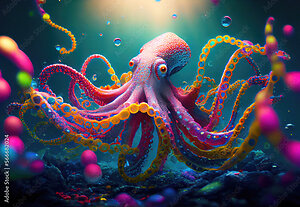The Octopus Approach to Supervision
If we begin with the image of the head of the octopus as a starting point, it represents the core of the work, which is the ongoing process of becoming the best practitioner you are capable of becoming. The main focus Is personal growth and development, cultivating a sound knowledge of who you are and how you relate In the world. Can we really be fully present in the work with clients without this ongoing awareness of our impact?
Though this focus will always be present it may over time become more or less foregrounded in relation to the other aspects of our work together. It’s a stretchy and flexible, fluid approach. A bit like the octopus.
I use the well established Seven Eyed Model as a framework for supervising. You could say the octopus Is floating around this model filling In some of the gaps, one of which Is the extended focus on self-discovery, resourcing, humour and the more spiritual or universal elements that can come up in our journeys as practitioners. To assist this process we will, as supervisor and supervisee, aim to:
Work in collaboration, acknowledging the fact that we are both professionals, individuals with unique gifts and offerings that we bring to therapeutic practice and the profession as a whole.
Participate in ongoing learning that is mutual and shared.
Be mindful of and find ways to prevent or repair the Intended or unintended harm caused by power dynamics and oppressive behaviours.
Utilise and respect differences (there will be many! But here are a few) of opinion, belief, lifestyle and ways of working. We may even find new understandings from those differences.
The Seven Eyed Model and The Eighth Tentacle.
Seven of the eight tentacles emanating from the head of the octopus in my approach, represent the modes of supervision work created by Peter Hawkins in 1985, used in any and all of the so called ‘people professions’. It is both relational and systemic. Below are the areas/modes we will reflect on In sessions. (Not necessarily all at once)
The Seven Modes of the Seven Eyed Model:
Mode 1: Focusing on the clients and what and how they present.
Mode 2: Exploring the strategies and interventions used by the supervisee.
Mode 3: Focusing on the relationship between the client and the supervisee, attending the client’s transference and learning from the unconscious supervision of the client.
Mode 4: Focusing on the supervisee.
Mode 5 Focusing on the supervisory relationship
Mode 6: The supervisor focusing on their own experience.
Mode 7: Focusing on the wider contexts in which the work happens.
THE EIGHTH TENTACLE
The seven modes above correspond to seven of the octopus tentacles. The eighth is an additional element of the work that considers the existential, spiritual, metaphysical, diffractive, quantum and esoteric. It could also be about science, humanism, political activism, nature and eco-systems or any beliefs that might be significant for you. The possibilities are endless and so you can also opt out of the whole thing. However, it is my style to check in on your self-resourcing.
What that looks like is up to you, but could Include, and Is not limited to:
A deeper connection to self/world/nature/others/the work Itself.
Religion/politics and activism.
Ideas/Art/Poetry/Writing/Music/Creativity
Divergences of thought and being - neurodiversity and creative method
Self-care/resourcing/Mindfulness/Meditation/Reflective Practice
Burnout/empathic fatigue
The Fluidity of The Core Conditions.
The person-centred approach to therapy (PCA) formed the core of my training as a therapist. I see it as an open, very fluid theoretical base that converges with many other modalities as a way of being present in the moment. The PCA interspersed with other concepts that complement and sometimes diverge from the basic tenets of the theory sit comfortably within the process of supervision. What has remained constant and evolving for me, and what I see as the cornerstone of therapy and supervision is the primacy of the core conditions:
•
Empathy
•
Congruence
•
Unconditional Positive Regard/Phenomenological acceptance.
These ways of being challenge us to always be aware of our impact on others and in doing so notice how the contextual, ever shifting nature of both our privilege and otherness is being played out. So, these concepts will always be around in our work together in some way because power dynamics, endemic in our profession and in the systems we find ourselves in, need to be attended to throughout the work. I think many of us carry the negative impact of not being seen. My way of attending and being present with you is a skill I can offer through complex times. I hope our paths will cross.
Fees: £80 per hour pro rata paid in advance of sessions
Session length: 60/75/90 minute sessions
Session Type: Online only




